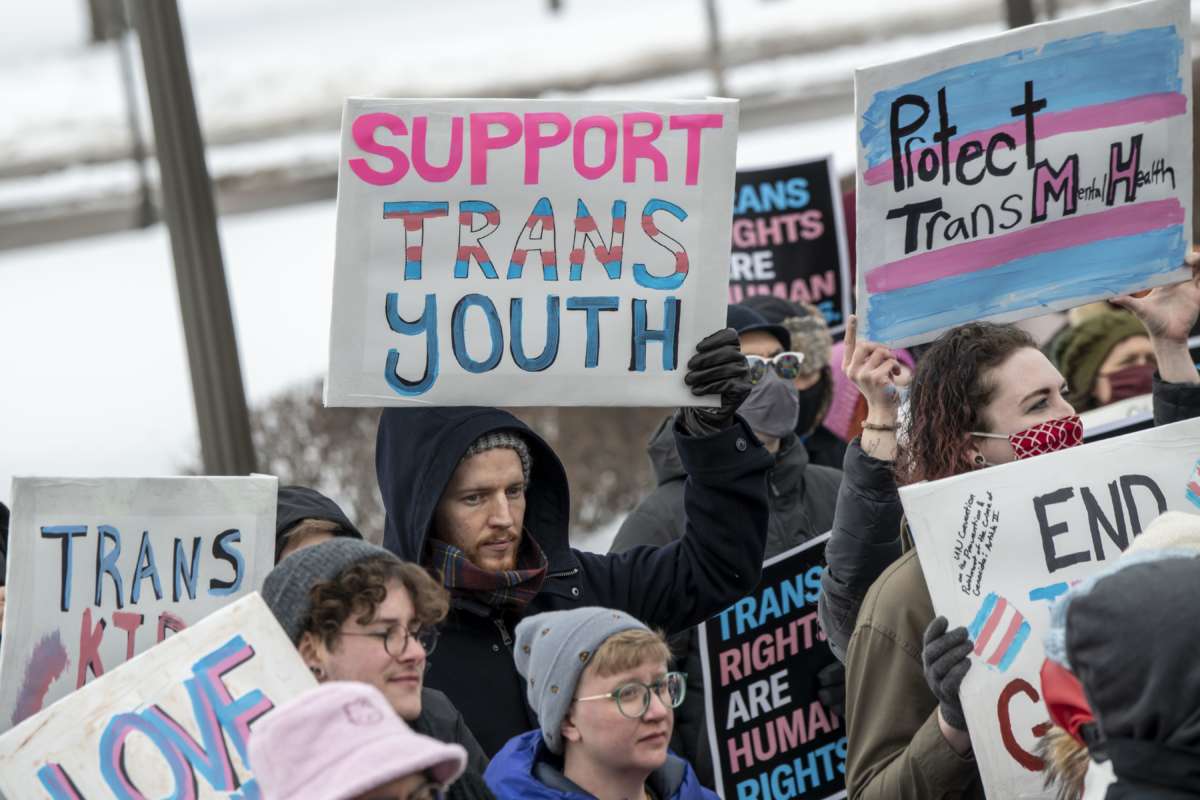Transgender Utah girls wishing to compete in high school sports this fall may now do so after a judge on Friday temporarily blocked a state law prohibiting trans student-athletes from joining teams that match their gender identity.
Plaintiffs in the case — which involves three trans girls who want to play on girls’ scholastic sports teams — and LGBTQ+ advocates welcomed the preliminary injunction issued by 3rd District Judge Keith Kelly, who wrote that the defendants “do not offer persuasive reasons to categorically ban all transgender girls from competing on girls’ teams.”
“This is a win not only for my child but for all girls in this state,” said Jean Noe, a pseudonymous plaintiff in the case. “This law is based on stereotypes and misconceptions that are harmful to all girls.”
“I am grateful the court has put this dangerous law on pause and that, at least for the moment, all Utah children can know that they are valued and supported,” she added.
The defendants — the Utah High School Activities Association, Granite and Jordan school districts, and their superintendents — had argued that the ban does not discriminate against girls because it targets “biological boys.”
However, Kelly, an appointee of former Republican Gov. Gary Herbert, wrote that “the ban singles out transgender girls and categorically bars them from competing on girls’ sports teams.”
“At the same time, other girls are free to compete,” he added. “This is plainly unfavorable treatment.”
🚨🚨🚨 MORE state constitutional law. A Utah state court blocks the state’s ban on transgender girls from participating in school athletics, finding it likely violates the equal protection guarantees under the Utah Constitution. pic.twitter.com/q36GZ1rhCR
— Anthony Michael Kreis (@AnthonyMKreis) August 19, 2022
The court’s injunction blocks enforcement of the ban while remaining litigation in the case proceeds through state courts.
Another parent plaintiff in the case, Debbie Roe, said: “My husband and I are very relieved by this decision. We are grateful the court understood how much harm this law has caused, which has been a huge source of stress and trauma for our child.”
“Our daughter just wants the same chance as other kids to make friends and play on the team she loves,” she added. “Today’s ruling gives her the opportunity to do that.”
In a written statement to the court, plaintiff Jenny Roe, a 16-year-old who will be a senior in the Granite School District this academic year, said she played volleyball as a junior and would like to do so again, as well as try out for the basketball team.
A federal judge has blocked Utah’s transgender athlete ban. As one parent of a trans girl said, it’s “a win not only for my child but for all girls in this state. This law is based on stereotypes and misconceptions that are harmful to all girls.” https://t.co/F3ZWekGKk0
— Gillian Branstetter (@GBBranstetter) August 19, 2022
Roe explained in her statement that she felt isolated at school and did not have much of a social life until she started playing volleyball.
“Once I joined the team, I had a great group of friends who supported me and who I loved being around,” she wrote. “This law scares me. I cannot imagine missing my last volleyball season with my team and I have been really upset just thinking about this.”
“If I cannot play with my team,” added Roe, “I am worried that I will not even want to go to classes or to school.”
The Salt Lake Tribune reports:
Now that the ban is on hold… the state’s back-up process for vetting transgender girl athletes will move forward. Under that, a commission will make decisions on which transgender athletes can compete.
The members are set to evaluate a player’s wingspan, weight, and height—and whether a player is taking hormone blockers—to determine if a transgender girl, in particular, might have an unfair advantage in a sport by being born male. Some don’t see that setup as a better option, suggesting that measuring teenagers’ bodies crosses boundaries.
According to the Movement Advancement Project, 18 states including Utah currently ban transgender students from participating in sports consistent with their gender identity.
While Republican-controlled states move to roll back transgender student rights, the Biden administration in June proposed new rules prohibiting educational institutions from discriminating against trans pupils while restoring Title IX protections gutted during the tenure of former President Donald Trump.
The Utah injunction comes two days after local media reported that the parents of cisgender girls who placed second and third to another cis female athlete filed a complaint with the Utah High School Activities Association expressing suspicions that the winner is transgender, a concern the body subsequently—and secretly—investigated by digging through her records going back to kindergarten.
“School investigates whether athlete is transgender after state win.”
Some that said, “That female athlete doesn’t look feminine enough.”
To them it’s worth terrorizing cis girls, too – just to make sure not a single trans athlete plays.https://t.co/sM0RS74gwk
— Frances_Larina (@Frances_Larina) August 18, 2022
Republican Utah Gov. Spencer Cox — whose veto of the state Legislature’s trans athlete ban was overridden in March — on Thursday responded to the parents’ complaint by saying that “making up allegations like that are pretty disturbing to me.”
“My goodness,” he added, “we’re living in this world where we’ve become sore losers, and we’re looking for any reason why our kid lost.”
Join us in defending the truth before it’s too late
The future of independent journalism is uncertain, and the consequences of losing it are too grave to ignore. To ensure Truthout remains safe, strong, and free, we need to raise $17,000 by midnight tonight. Every dollar raised goes directly toward the costs of producing news you can trust.
Please give what you can — because by supporting us with a tax-deductible donation, you’re not just preserving a source of news, you’re helping to safeguard what’s left of our democracy.
